US Expresses Support For Anti-government Protests In Iran
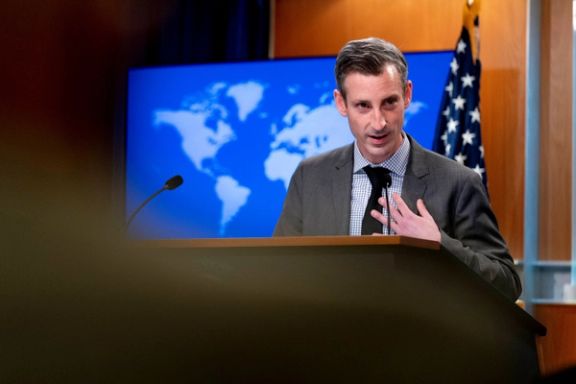
The United States has expressed support for anti-government protests in Iran, saying the Iranian people have a right to hold their government accountable for the current situation.

The United States has expressed support for anti-government protests in Iran, saying the Iranian people have a right to hold their government accountable for the current situation.
US State Department Spokesperson Ned Price said in a tweet on Sunday, “We support their rights to peaceful assembly and freedom of expression online and offline -- without fear of violence and reprisal”. “Brave Iranian protestors are standing up for their rights”.
This is the first official reaction by the Biden Administration to the ongoing protests in several Iranian cities, triggered by a sudden hike in food prices. But the unrest has quickly turned into anti-Islamic Republic protests with people chanting slogans against top government leaders.
Sunday night, people were heard chanting “Death to Raisi”, “Death to Khamenei”, as some gunshots were heard in Shahre Kord, the center of Chaharmahal and Bakhtiari provinc. Some reports said that security forces directly fired at demonstrators. So far, five deaths have been reported in more than a week of protests. Security forces also use batons and tear gas against protesters.
Many citizens have also been detained but there is no total number reported by reliable sources. Many younger people are among the detainees and some reports speak of security forces arresting whole families if some members were identified during protests.
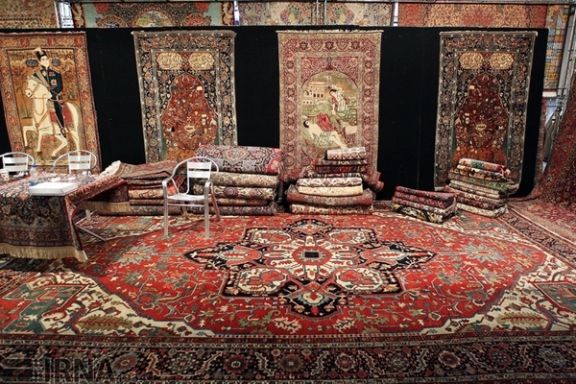
A member of Tehran’s Chamber of Commerce says Iran’s exports of hand-woven carpets have dropped to about $70 to $80 million per year from about $500 million before the US sanctions.
Head of Tehran's Chamber of Commerce's Exports Committee Razi Haji Aghamiri told ILNA on Sunday that unprofessional measures by the trade authorities have decreased the exports to such a low point that practically there is nothing left of this business.
He described the restrictions by Iran’s Central Bank for the revenues of carpet exports as the “coup de grâce” to the sector, but the sharp drop in exports seems to be more related to the US sanctions.
Data from the Trade Ministry show that the export of traditional Iranian hand-woven carpets in 2001, when nuclear sanctions against Iran had not yet been imposed, was more than half a billion dollars, over a quarter of which was imported by the United States, with Germany, Lebanon, and Britain as other major customers.
The exports picked up again in 2017, immediately after the implementation of Iran's 2015 nuclear deal with world powers, the Joint Comprehensive Plan of Action (JCPOA), reaching about $426 million. But the figure started to fall again after the US withdrawal from the deal in 2018 when Washington reimposed sanctions on the import of Iranian rugs. Importing Iranian carpet to the United States is forbidden even through a third country.
In August 2018, Fereshteh Dastpak, the head of Iran's National Carpet Center at the time, claimed that the value of the hand-woven carpet exports amounted to $1.2 billion annually over the past decade.
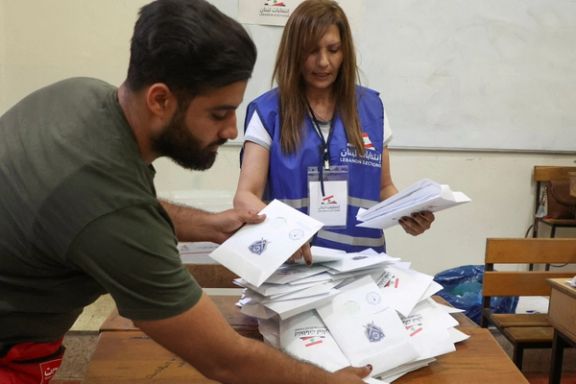
Iran-backed Hezbollah lost a seat in its south Lebanon stronghold to a candidate backed by opposition groups in parliamentary polls on Sunday.
An opposition candidate and two Hezbollah officials confirmed the result, citing preliminary results.
Two Hezbollah officials said Elias Jradi, an eye doctor running on the opposition-backed "Together Towards Change" list, won an Orthodox Christian seat previously held by Assaad Hardan of the Syrian Socialist Nationalist Party, a close Hezbollah ally who has been an MP since 1992.
Jradi told Reuters his list had secured enough votes to win one seat, an opposition breakthrough in an area dominated by the Iran-backed group and its allies, but would not confirm it would go to him before results were finalized.
Shi'ite Muslim Hezbollah and its allies are expected to retain control of the remaining 10 seats in the district, the Hezbollah officials said.
The election for the 128-member parliament is the first since Lebanon collapsed into economic crisis in 2019. Results are expected to emerge through the night.
Opposition candidates are mainly from leaders of protests that rocked Lebanon in 2019, aimed at a political elite that has controlled politics in the small but strategic country for decades, eventually leading the economy into disintegration. Hezbollah has dominated the sectarian political landscape in the past decade.
Hezbollah and its allies won a majority in 2018.
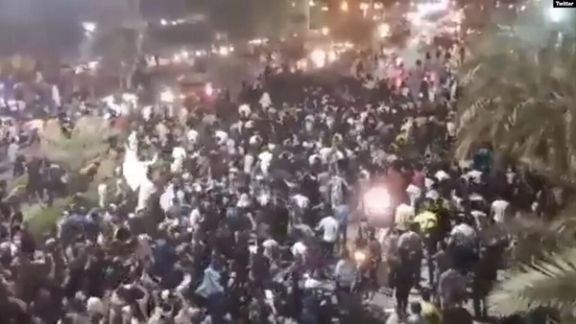
Reports and images on social media indicate that anti-government protests took place Sunday night in at least one provincial center in Iran with gunshots heard.
The protest took place in Shahre Kord, the center of Chaharmahal & Bakhtiari province 120 kilometers (80 miles) southwest of Esfahan in central Iran. In recent days, Shahre Kord has witnessed nighttime protests against the government.
Saturday night protests had taken place in numerous small towns and cities across the country, triggered by a sudden hike in food prices. But the unrest quickly turned into anti-Islamic Republic protests with people chanting slogans against top government leaders.
Sunday night, people were heard chanting “Death to Raisi”, “Death to Khamenei”, as some gunshots were heard in Shahre Kord. Some reports said that security forces directly fired at demonstrators. So far, five deaths have been reported in more than a week of protests. Security forces also use batons and tear gas against protesters.
In some towns, IRGC Basij centers have been abandoned after citizens attacked and tried to occupy them. In one town the religious schools was also abandoned as it was a target of anti-government protesters.
Many citizens have also been detained by there is no total number reported by reliable sources. Many younger people are among the detainees and some reports speak of security forces arresting whole families if some members were identified during protests.
The government of President Ebrahim Raisi decided to stop an import subsidy for essential food imports, such as wheat, cooking oil and also animal feed. The subsidy had been set up in April 2018 just before former US president Donald Trump pulled out of the 2015 nuclear agreement and imposed tough economic sanctions.
The government had said subsidizing the food imports was costing $8-10 billion annually but more recent estimates have put the number between $15-20 billion.
As soon as the government confirmed the end of the subsidy food prices jumped two to threefold and certain items such as cooking oil disappeared from supermarkets. The move by the government came at a time when an economic crisis triggered by US sanctions was getting worse, despite official claims of higher oil exports.
Authorities have reacted to the protests by dispatching security forces from the capital Tehran to smaller cities that have been the centers of unrest. They have also cut off mobile internet access in many areas to prevent people from sharing videos and news of the protests. Shahre Kord is no exception with mobile internet disrupted on Sunday.
Reports by citizens in Iran also say that authorities jammed signal of satellite television channels beaming news from outside the country, such as the Voice of America, Iran International TV and other stations.
Iranian government-controlled media is mostly silent about the protests, but Iran International received information on Saturday that censors ordered newspapers and websites to refrain from using certain words like “confrontation” in their reporting. Security forces gathered in some areas of the capital to quickly react to any signs of protests.
Protests were also reported in a town near Shahre Kord on Sunday and there was a video of people burning tires on a highway in the southern parts of Tehran.
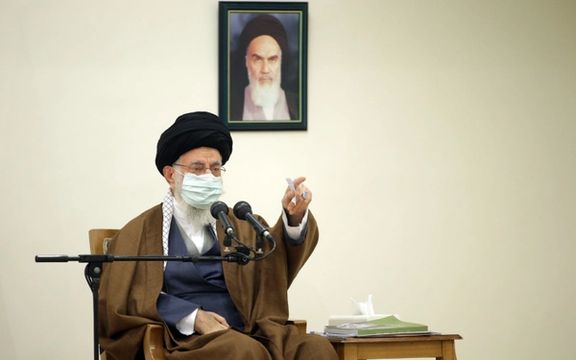
As street protests enter their second week, Iranian politicians and military men are offering their insights about the economic crisis and rapid price hikes.
Food prices that doubled and tripled in recent days triggered the unrest that have turned into fierce anti-government protests in many parts of the country.
Most of the explanations target the previous government or President Ebrahim Raisi's lack of an economic policy. But in a different analysis to explain the crisis that has brought thousands into the streets, the deputy commander of the Revolutionary Guard (IRGC) Yadollah Javani lashed out at government's critics, saying that some people are gradually blaming Supreme Leader Ali Khamenei for the economic problems, because he does not allow negotiations with the United States.
This is the first time an official of Javani's calibre acknowledges the debate about Khamenei's responsibility for the diplomatic deadlock, which has led to the country's biggest economic problems in modern history.
However, during the past weeks Javani happened to lose a lot of his credibility after he was implicated in an alleged espionage or infiltration case involving a foreign woman who had penetrated Khamenei's inner circle and even posted two dozen articles on his official website. Therefore, his comments will be likely taken as an attempt to appease Khamenei to redeem his trust.
Better Diplomacy
Over the weekend, Hassan Khomeini, a grandson of Rouhollah Khomeini, the founder of the Islamic Republic criticized the Raisi administration for failing to tackle the diplomatic impasse that has been preventing an economic breakthrough since the 2018 US pull-out from JCPOA, the nuclear deal with Iran.
The young Khomeini, an aspiring political figure who has often been criticized for wasting trillions of rials on developing a large complex housing his grandfather's tomb, said a good team of diplomats should have been able to solve the problem with the United States or at least open a new path “within 24 hours.”
Lack of trust
Former communication minister and presidential election hopeful Mohammad Gharazi said the root-cause of the unrest is that Iranians do not trust the government. Gharazi added that President Ebrahim Raisi knows better than everyone else that Iran's economic problems have worsened since he took office in August 2021.
Gharazi argued that the Raisi administration has not been able to convince the Iranian society that he is doing the right thing to help them.
Raisi, who recently stopped an annual $15-20 billion food import subsidy, argues that he is reforming the economy to prevent corruption, and there will be no gain without pain.
Nonetheless, some of Raisi's supporters such as conservative lawmaker Reza Taghipour, a former aide of President Mahmoud Ahmadinejad keep blaming former President Hassan Rouhani for country's current problems without mentioning why the new government has not been able to fix the problems after 10 months.
Famine on the way
In another development, reformist politician Mohammad Ali Abtahi criticized state-owned media for justifying the Raisi administration's failure, saying that "It is wrong to pretend that the entire Iranian society is happy about the way the administration has manipulated the subsidy system." Abtahi said that state-owned media's approach during the past week has been provocative.
During the week, the state-owned television and Khamemnei-affiliated Kayhan newspaper have been supporting Raisi's policy and not only ignoring, but also attacking and belittling the protests.
In the meantime, conservative political analyst Mehdi Ayati said in an interview with Nameh News, close to former Intelligence Minister Mostafa Pourmohammadi that "a famine will be on its way in Iran if food rationing does not start as soon as possible."
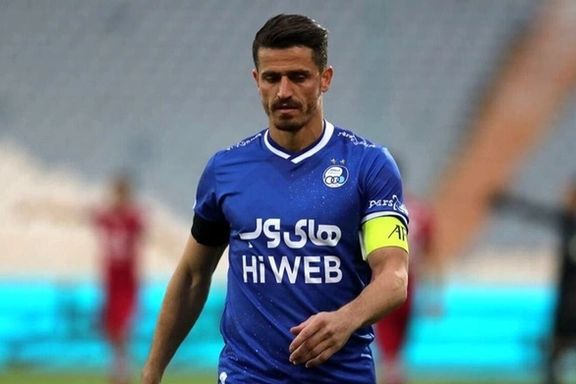
A popular Iranian footballer has rebuked the Islamic Republic’s authorities for their handling of recent protests that was sparked by a sudden rise in prices.
Veria Ghafouri, the captain of Tehran's Esteghlal football (soccer) club, said on the sidelines of a match against Foulad club on Saturday that “It is the right of the Iranian people to live a happy life".
The national team player, who has time and again spoken out against the government and in support of people protesting social and economic issues, added, "I do not know, are the officials not ashamed to see this situation?"
Ghafouri said that when it comes to social and civic issues, football is no longer his priority, and he uses his position to express the demands of his fans.
Following days of unrest across Iran, the match between Esteghlal and Foulad was held without spectators in Ahvaz, the provincial capital of Khuzestan that was the hotbed of the protests which then spread to several other cities.
Other celebrities are also reacting to the protests and the clamp down by security forces.
Iranian actor Ali Nassirian tacitly criticized the current situation of the country during a ceremony at Tehran’s City Theater on Saturday night, saying that holding such celebrations is beyond the people’s patience and spirit. "In such circumstances, we should not celebrate when our people are not in a good mood, we could talk instead of playing music," he added.
Iranian dissident director Jafar Panahi recently said violence is the solution of despots, describing the poverty in Iran as a result of “incompetent rulers”.